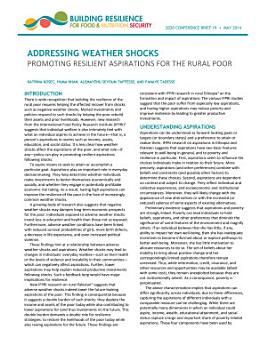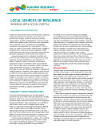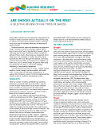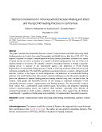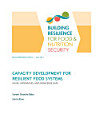Addressing weather shocks: Promoting resilient aspirations for the rural poor
Kosec, Katrina · Khan, Huma · Seyoum Taffesse, Alemayehu · Tadesse, Fanaye
4/2014 · 2020 Conference Brief 19. kniha · Intl Food Policy Res Inst
5,0star
1 recenziareport
E‑kniha
4
Počet strán
family_home
Vhodné
info
reportHodnotenia a recenzie nie sú overené Ďalšie informácie
Táto e‑kniha
New IFPRI research on rural Pakistan suggests that adverse weather shocks indeed lower the future?looking aspirations of the poor. This finding is consequential because it suggests a double burden of such shocks: they deplete the income and assets of the poor today while also contributing to lower aspirations for (and thus investments in) the future. This double burden demands a double role for resilience strategies: to restore the livelihoods of the poor today while also raising aspirations for the future. These findings are consistent with IFPRI research in rural Ethiopia on the formation and impact of aspirations. The various IFPRI studies suggest that the poor suffer from especially low aspirations, and having higher aspirations may reduce poverty and improve resilience by leading to greater productive investments.
Hodnotenia a recenzie
5,0
1 recenzia
Ohodnoťte túto elektronickú knihu
Povedzte nám svoj názor.
Informácie o dostupnosti
Smartfóny a tablety
Nainštalujte si aplikáciu Knihy Google Play pre Android a iPad/iPhone. Automaticky sa synchronizuje s vaším účtom a umožňuje čítať online aj offline, nech už ste kdekoľvek.
Laptopy a počítače
Audioknihy zakúpené v službe Google Play môžete počúvať prostredníctvom webového prehliadača v počítači.
Čítačky elektronických kníh a ďalšie zariadenia
Ak chcete tento obsah čítať v zariadeniach využívajúcich elektronický atrament, ako sú čítačky e‑kníh Kobo, musíte stiahnuť príslušný súbor a preniesť ho do svojho zariadenia. Pri prenose súborov do podporovaných čítačiek e‑kníh postupujte podľa podrobných pokynov v centre pomoci.
